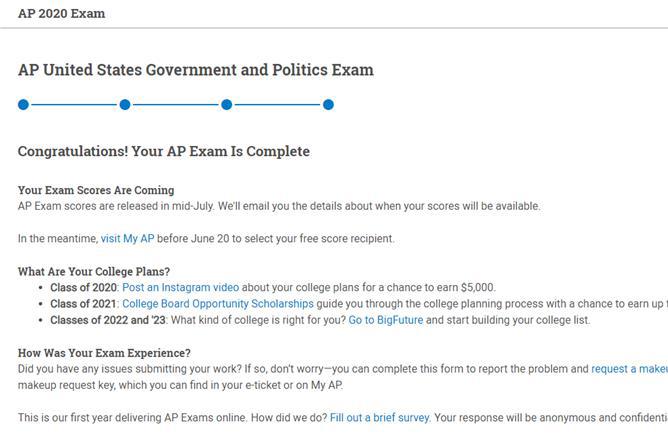
Colorado students are finishing up their Advanced Placement exams this week, and for many, it was anything but a smooth ride.
Thousands of high school students across the country reported trouble submitting test answers because of technical glitches and must now take the high-pressure tests again in June. But a class-action lawsuit on behalf of high school test-takers is aiming to stop the June test.
The lawsuit was filed Tuesday in federal court against the College Board, which administers the tests, and seeks more than $500 million in monetary relief. The suit alleges a breach of contract, gross negligence, misrepresentation and violations of the Americans With Disabilities Act.
It asks that the College Board accept test answers where students have proof they were completed by timestamp, photo and email. Many students complained the system would not accept attachments and would lose in-progress work and that secure submission forms didn’t work.
Tests are typically three hours and taken in schools, but due to the closure of schools in March to curb the spread of coronavirus, the College Board developed a 45-minute online version. Almost immediately after the two-week testing period began, students flooded social media with accounts of problems.
Hayley Breden, a social studies teacher at Denver’s South High, said a couple of her AP History students who registered didn’t receive their electronic tickets to enter the exam. Another student was able to only submit half of what he wrote.
“He’s waiting to hear if he's allowed to take the retake or not,” Breden said.
Another student received an error message after she submitted her written answers and was told to sign up for the June retake.
“So that student is really frustrated because not only did she work hard all year, but she took the time to type her whole essay and now she decided to sign up to take the retake. That means she's taking the exam twice when there could have been a process in place to accept the response that she typed in the initial exam.”
Teachers say that students place extraordinary pressure on themselves to score high on the AP tests — some to get into a preferred college, others because they’re promised they can save money by not having to take a college class. AP tests come with a price tag of their own, costing $94 each.
“I think students are really feeling a lot of pressure to take these exams even though, particularly this year, they're not really a great measure of all the work they did and all that they know,” Breden said.
In 2018, Colorado had 50,315 public school students take 84,201 AP exams.
Peter Schwartz, the College Board chief risk officer and general counsel, gave this statement on the lawsuit:
“When the country shut down due to coronavirus, we surveyed AP students nationwide, and an overwhelming 91 percent reported a desire to take the AP Exam at the end of the course. Within weeks, we redesigned the AP Exams so that they could be taken at home. Nearly 3 million AP Exams have been taken over the first seven days. Those students who were unable to successfully submit their Exam can still take a makeup and have the opportunity to earn college credit.
This lawsuit is a PR stunt masquerading as a legal complaint being manufactured by an opportunistic organization that prioritizes media coverage for itself. It is wrong factually and baseless legally; the College Board will vigorously and confidently defend against it, and expect to prevail."
Denver Public Schools said about half of its students were struggling with the technology for the testing and how to complete AP exams.
But several other metro Denver school districts reported they had not heard of problems with students taking tests.
Even before the AP tests were administered this year, critics were already raising concerns about equity issues: spotty internet access for some students, lack of quiet space in cramped living quarters and improper accommodations for students with disabilities, to name a few.
The College Board told districts this week that test takers have the option of submitting their answers via email, except for World Language exams. But for the thousands of students who took the exam last week, that doesn’t help.
“I know a lot of students and also their families are pretty upset about this because the second week of tests are getting a different experience than the first week of tests,” Breden said.









